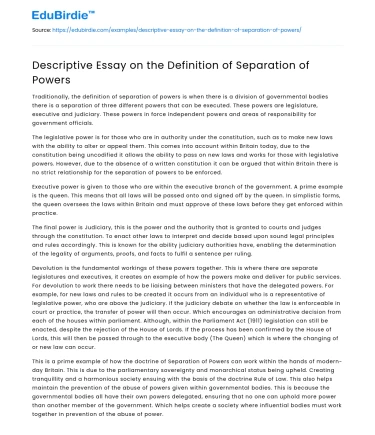Traditionally, the definition of separation of powers is when there is a division of governmental bodies there is a separation of three different powers that can be executed. These powers are legislature, executive and judiciary. These powers in force independent powers and areas of responsibility for government officials.
The legislative power is for those who are in authority under the constitution, such as to make new laws with the ability to alter or appeal them. This comes into account within Britain today, due to the constitution being uncodified it allows the ability to pass on new laws and works for those with legislative powers. However, due to the absence of a written constitution it can be argued that within Britain there is no strict relationship for the separation of powers to be enforced.
Save your time!
We can take care of your essay
- Proper editing and formatting
- Free revision, title page, and bibliography
- Flexible prices and money-back guarantee
Executive power is given to those who are within the executive branch of the government. A prime example is the queen. This means that all laws will be passed onto and signed off by the queen. In simplistic forms, the queen oversees the laws within Britain and must approve of these laws before they get enforced within practice.
The final power is Judiciary, this is the power and the authority that is granted to courts and judges through the constitution. To enact other laws to interpret and decide based upon sound legal principles and rules accordingly. This is known for the ability judiciary authorities have, enabling the determination of the legality of arguments, proofs, and facts to fulfil a sentence per ruling.
Devolution is the fundamental workings of these powers together. This is where there are separate legislatures and executives, it creates an example of how the powers make and deliver for public services. For devolution to work there needs to be liaising between ministers that have the delegated powers. For example, for new laws and rules to be created it occurs from an individual who is a representative of legislative power, who are above the judiciary. If the judiciary debate on whether the law is enforceable in court or practice, the transfer of power will then occur. Which encourages an administrative decision from each of the houses within parliament. Although, within the Parliament Act (1911) legislation can still be enacted, despite the rejection of the House of Lords. If the process has been confirmed by the House of Lords, this will then be passed through to the executive body (The Queen) which is where the changing of or new law can occur.
This is a prime example of how the doctrine of Separation of Powers can work within the hands of modern-day Britain. This is due to the parliamentary sovereignty and monarchical status being upheld. Creating tranquillity and a harmonious society ensuing with the basis of the doctrine Rule of Law. This also helps maintain the prevention of the abuse of powers given within governmental bodies. This is because the governmental bodies all have their own powers delegated, ensuring that no one can uphold more power than another member of the government. Which helps create a society where influential bodies must work together in prevention of the abuse of power.
Although Barber (2001) has argued that there is no formal practice for the separation of powers within Britain, because of the uncodified constitution that is enacted, falling loosely and broadly through the powers given within the Judiciary. Not only this but discussed that partial separation would work better within a society of an unwritten constitution due to the checks and balances that occur.
Overall, the separation of powers does not always work well in liaison and can create political debates within the houses, due to the indiscretions between the Judiciary and the Legislative appointments. It can also be debated that the Parliament Act 1911 creates inconsistencies through the parliament and the executives. The separation of powers shows the fundamental values of the doctrine by ensuing that modern day Britain has shared out delegated powers, meaning that societies values can stay intact through no overshadowing powers present.






 Stuck on your essay?
Stuck on your essay?

